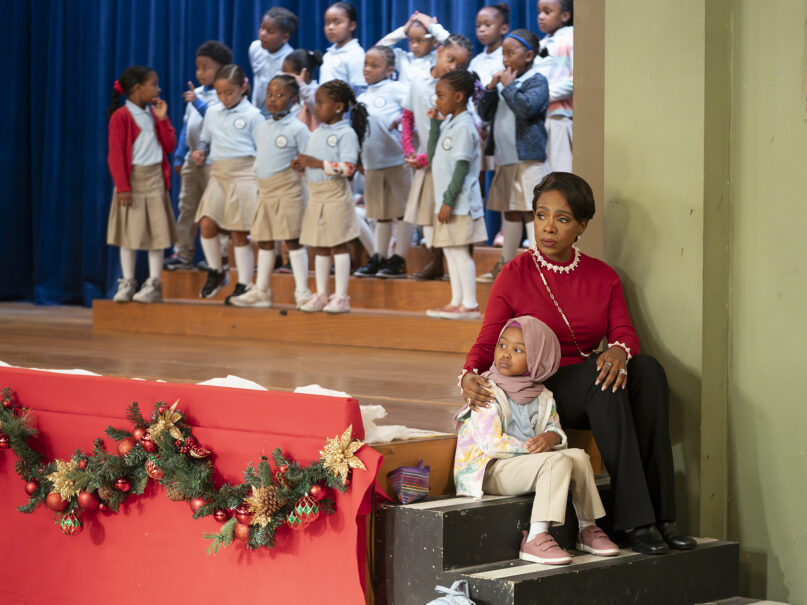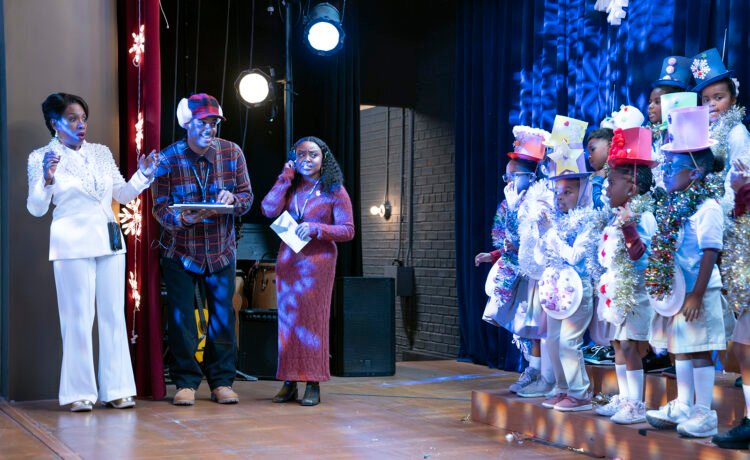(RNS) — Non-Christian parents know the difficult balance of trying (and often failing) to teach their child that Santa is not “for us” without coming off like Scrooge. Life in December would be much easier if our culture made room for religious and cultural differences.
A model for how to do this appeared recently in an episode of ABC’s “Abbott Elementary” (for streamers, it was Season 4, Episode 7). Titled “Winter Show,” the episode provided a hilarious, heartwarming example of how Christians can celebrate America’s religious diversity and even challenge our Christian-centrism without putting the onus on religious minorities to explain or justify their theological differences.
This time of year, Christian nationalists claim there is a “war on Christmas,” pointing to those who prefer to greet others with “Happy holidays,” including those who celebrate a different event at the end of the Gregorian calendar year — Hanukkah, winter solstice or Kwanzaa. They can take comfort that December in the United States is still decidedly Christmas-centric. This can be isolating for people who don’t celebrate the holiday or have introduced anti-consumerist practices to their Christmas celebrations.
The latter is a major plotline in the all-holiday episode of “Abbott Elementary.”
“Abbott Elementary” chronicles the everyday experiences of staffers at an underfunded public school in Philadelphia. Created by actor-comedian-writer Quinta Brunson, a Philadelphian, the show has been hailed for its commitment to inclusive storytelling, resisting the common Hollywood approach of depicting Black people’s lived experiences as a monolithic narrative. The show captures the rich religious tapestry of Black Philadelphia. The city is home to around 300,000 Muslims, 80% of whom are Black.
In “Winter Show,” Mrs. Howard, the beloved Abbott kindergarten teacher and a devout Christian, decides to change the annual Christmas show after seeing a Muslim student, Khadija, being teased by two of her classmates because she does not celebrate Christmas and cannot participate. While a growing number of Muslims in the U.S. do celebrate Christmas as a secular holiday, many do not due to differing beliefs on Jesus’ nature and role. Muslims reject the Trinity, viewing Jesus as the Messiah but not the Son of God or God in the flesh.

Teacher Barbara Howard (Sheryl Lee Ralph), right, sits with Khadija (River Blossom) in the “Winter Show” episode of “Abbott Elementary.” (Disney/Gilles Mingasson)
In place of the Christmas show, Mrs. Howard creates “Winter at Abbott.” She ditches the school Christmas tree along with the kindergarten class’s performance of “Deck the Halls,” the school step team’s accompaniment of “Christmas in Hollis” by Run DMC and the Christmas present giveaway. Mrs. Howard explained: “The whole point of this show is celebrating that holiday feeling of being together. And every student deserves to feel included.”
At a loss to find an appropriate winter song, Mrs. Howard creates one that is so dry and serious that she eventually decides to perform it by herself. Only after Mrs. Howard loses her voice do her students step in, singing their own number about scary snowmen and hot cocoa farts, with Janine’s step team joining in. After the performance, Khadija’s mother thanks Mrs. Howard for giving Khadija an opportunity to participate in the show.
“The Winter Show” is not the first time Brunson has included religious minorities in the show’s themes. Season 2’s Christmas episode, “Holiday Hookah,” saw Brunson’s character, Janine Teagues, hand out a Star of David cookie and a Kwanzaa cookie along with the accustomed Christmas tree cookies. Her Jehovah’s Witness student even got a plain cookie. “Not everyone celebrates Christmas, and I acknowledge that in my classroom,” Janine explained.
In the current season’s episode, even handing out holiday cookies is too obvious. Religious inclusion is presented as a regular everyday occurrence. It shows that it’s not necessary to make a big deal to make room for everyone.
This year, moments like “The Winter Show” are needed more than ever. Since Oct. 7 of last year, there has been a rise in anti-Muslim sentiment, especially at schools and universities in the United States. Media that accurately depict the diversity of the Muslim American experience can help foster understanding.
But the media need to show Christians contributing to this understanding. As ethnic studies scholar Evelyn Alsultany explains, mainstream American media’s focus on depicting “good Muslims” committed to promoting American democracy and multiculturalism often comes at the expense of “bad Muslims” who don’t fully assimilate into mainstream white American culture. Far less attention is paid to Christians’ role in the erasure of religious minorities or Islamophobia. Instead, the onus is put on Muslims or other religious minorities to advocate for recognition of their religious practices and differences.
That’s why “Abbott Elementary” is so important. After Mrs. Howard observes how Khadija’s exclusion has encouraged bullying, she doesn’t ask Khadija or her parents what to do. She springs into action to provide an inclusive solution. To be sure, collaborating with parents or students keeps teachers from speaking over marginalized people, but it can mean asking them to do the work of fixing problems they did not create. It also ignores the power differentials at play. How might Khadija’s classmates have treated her if they thought she was the driving force behind the show changes?
“Abbott Elementary” did not get everything right. What’s the difference between a Christmas tree and a “winter tree,” for instance, if both are decorated pine trees? But the episode provided space for more conversations about what it means to be inclusive and who is ultimately responsible for making space for others.
In an increasingly Islamophobic society, that matters, and more content creators should be encouraged to explore meaningful moments of religious inclusion.
(Kayla Renée Wheeler is an assistant professor in the theology department and the gender and diversity studies program at Xavier University-Ohio. The views expressed in this commentary do not necessarily reflect those of RNS.)















